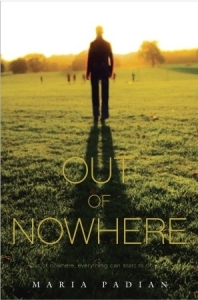Maria Padian’s title Out of Nowhere offers perspective on how members from a Franco-American long-term community react to Somali new arrivals in their Maine hometown. At the center is Tom, a high school senior, who, despite making cultural blunders and being confronted with conflicting views from his family and surrounding community, is constantly willing and open to learning about his Somali classmates. We’re immensely grateful for Padian’s work on this title and for all the support that she has shown for I’m Your Neighbor, Portland.
VISIT Maria Paidan’s website for more about the author and Out of Nowhere
JOIN US at the Portland Public Library on August 2nd to celebrate this title
On Writing Out of Nowhere
I grew up in a family where the conversation at holiday dinners was a blizzard of accents. The food combinations were a bit unusual (Spanish rice served with Irish soda bread?) and often, at odd hours, the telephone would ring. My mother would answer those calls from distant relatives by speaking very loudly and slowly into the receiver, to accommodate the poor reception and delays from transcontinental lines.
All four of my grandparents were immigrants, and their stories were woven deeply into the fabric of our third-generation lives. They were maids, butchers, bar keepers and bus drivers. They arrived in New York City with little besides youth and optimism, and relied on their churches and their contacts from “back home” to get established. They didn’t send their own children to college, but my siblings and I went. They worked hard to build new lives and create opportunities for their children and grandchildren, most of whom went on to realize educational and economic success.
A day does not pass that I don’t recall them with grateful admiration.
So it was with great interest that I followed the arrival of new immigrants to my now-home state of Maine: Somali refugees, fleeing civil war in their own country, and resettling in unprecedented numbers in the city of Lewiston. Recalling my own grandparents, I wondered how these newcomers would fare. My relatives struggled despite having many affinities with the dominant culture: they were white, they were Christian, they were literate, half of them spoke English. How, in a post-9/11 America, would black, Muslim, destitute, people fare? Most did not speak English and many couldn’t read, even in their own language.
I suppose it’s no surprise that the stories that interested me the most were those from young people. As a Young Adult author, I’m naturally drawn to teens and adolescents: I love their passion and their candor. And as I met people from both Lewiston and Portland, both young and old, and spoke with them about receiving these newcomers or being these newcomers, I found that repeatedly my conversations with teens were uplifting and energizing and revelatory. My conversations with adults, except for a few cases, were dispiriting, political and cagey.
The fact is the immigrant story is written by the young, and while we adults can bluster and argue and finger point and pigeonhole all we want, our children and grandchildren are the ones who will get down to the business of living together and redefining what it means to be an American. At some point I decided I didn’t want to speak with adults any longer: I wanted to write a story about teens, from their perspective. It took a little searching and a few false starts, but I was finally fortunate enough to meet young people who not only had the command of English to tell me their stories, but also had the courage to trust me with their stories.
The resulting novel, Out of Nowhere, is inspired by anecdotes told to me by those young people, as well as accounts I’ve read about refugee communities elsewhere in the United States. I used recent historical events in Lewiston, Maine as the scaffolding for the plot, but the characters in the book are fictitious and much of what transpires is an amalgam of what I’ve heard, what I’ve studied, and what I’ve imagined. It would be a mistake to comb through these pages in search of actual people and things that really happened. Instead, I hope readers will come away with a greater understanding of what it means to be a stranger in new world as well as to receive a stranger in an established world.


